To bring sustainability and prosperity to their farms, some agriculturalists in southern Taiwan have embraced innovative types of companion planting. In contrast to the monoculture that dominates much of the rich world’s farmland, companion planting is the cultivation of different crops in proximity, usually to optimize the space, for pest control or to enhance pollination.
The symbiotic relationship between cacao trees and betel nut, which may be unique to Pingtung County, is striking when one visits the cacao plantations maintained by Choose Chius (邱氏可可) and Wugawan (牛角灣) in Neipu (內埔).
The history of growing cacao in Taiwan goes back to Japanese colonial rule. Taichiro Morinaga, founder of Morinaga & Co — the first modern candy company in Japan, and the first manufacturer of chocolate in that country — visited Taiwan in 1927 to find land suitable for growing cacao. He hoped the company could become self-sufficient in cocoa in order to meet the high demand for chocolate in Japan.
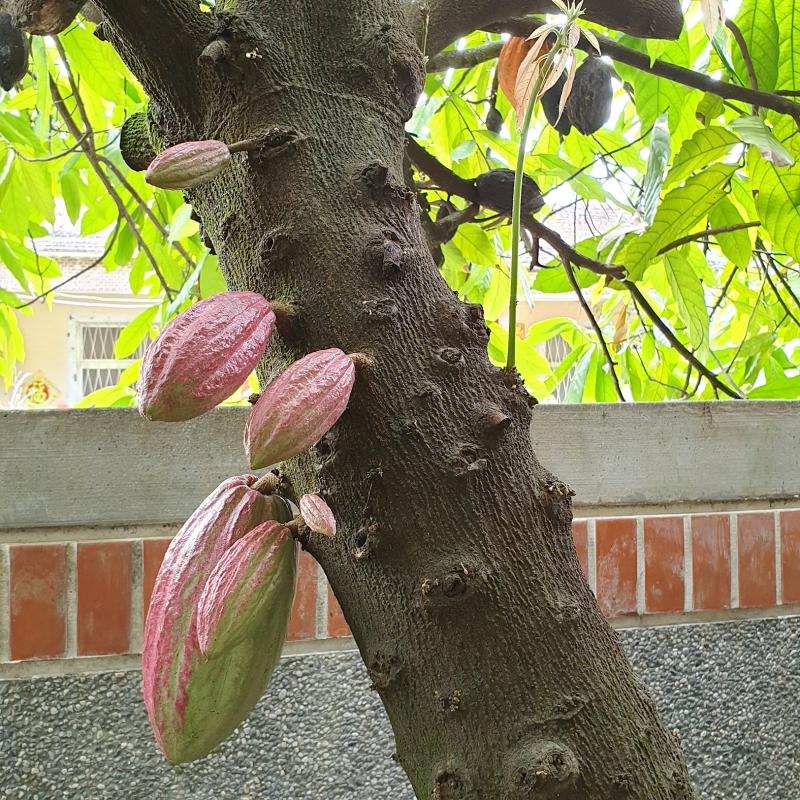
Photo: Katy Hui-wen Hung
His successor, Matsuji Ogushi, continued the cacao mission in 1937, setting up a cacao-focused research institute in Pingtung County. However, challenging conditions and the outbreak of World War II dashed Morinaga’s and Ogushi’s Taiwan chocolate dreams.
When the Japanese left in 1945, the Neipu area was dotted with cacao trees, but unsustainable farming techniques meant few of them survived. The growing of cacao became a forgotten wrinkle in the region’s agriculture history, especially after the Chinese Nationalist Party (KMT) regime began to promote betel nut for its economic value.
HAKKA CHOCOLATE
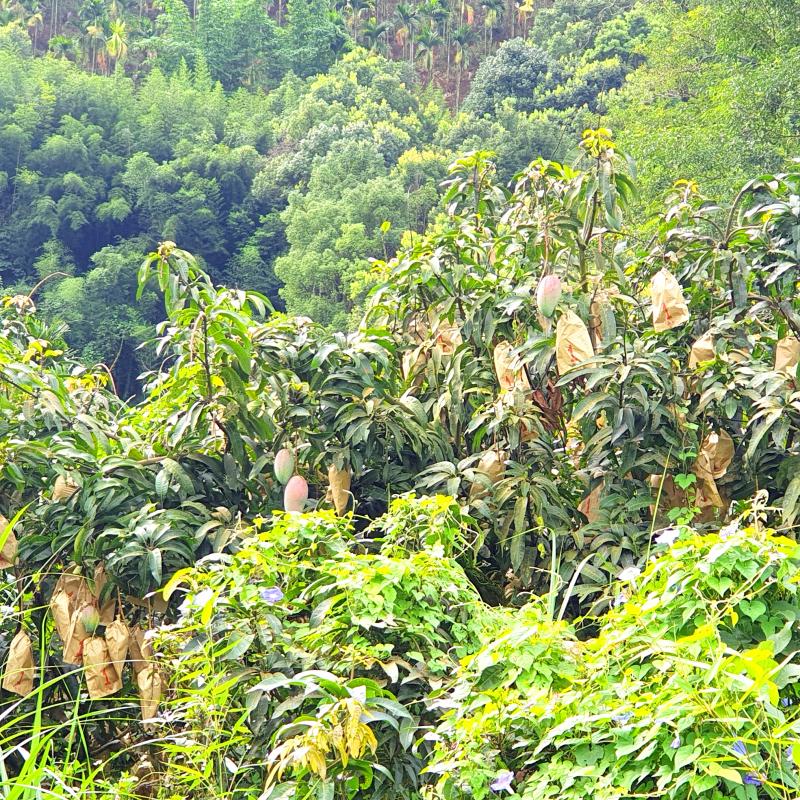
Photo: Katy Hui-wen Hung
Now, as before, cacao cultivation is concentrated in Hakka communities in Pingtung County. Chiu Ming-sung (邱銘松), a Hakka farmer who started growing betel nut in 1975, led the cacao comeback in 2000. He was seeking a new business direction, recognizing that the popularity of betel nut was beginning to wane.
Chiu discovered that growing cacao under betel nut palms is the best way to develop a new business while continuing with the old. The ideal cacao plantation is hot and humid, but sheltered from both sunshine and wind. Betel nut palms provide shade. During the typhoon season, tying cacao trees to the trunks of betel nut palms prevents the former from toppling.
With support from an extended family and a great deal of effort to develop new techniques, in 2010 Choose Chius became the first Taiwanese “from tree to bar” chocolate brand. There are now more than 30 across Pingtung.
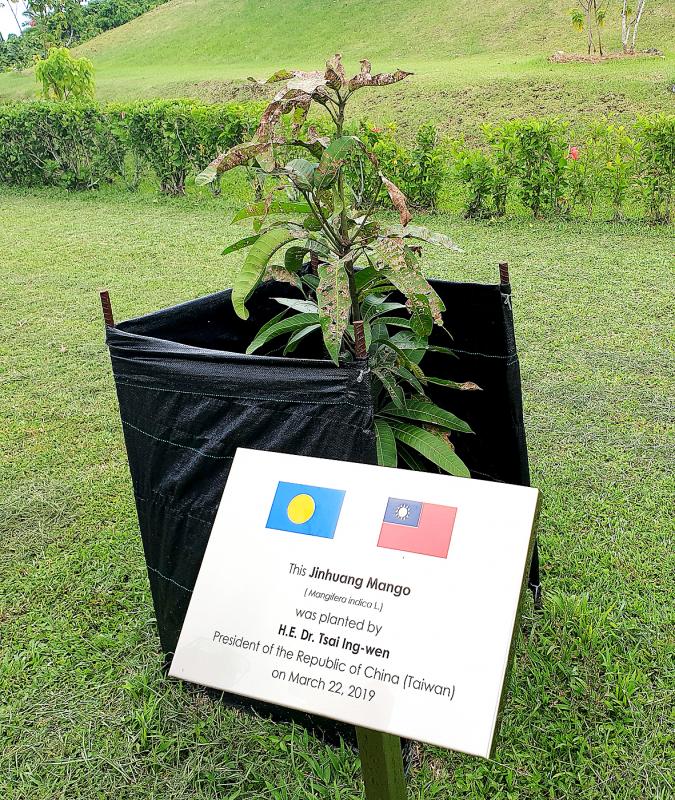
Photo: Katy Hui-wen Hung
CHOCOLATE CURRY AND NOODLES
Wugawan founder Lai Hsi-hsian (賴錫賢), a pineapple farmer who practices eco-friendly agriculture, developed with his wife a curry recipe that uses 100-percent chocolate and chocolate-flavored noodles. The cacao trees he cultivates are protected by banana trees and betel nut palms.
Another kind of companion planting was pointed out to this reporter during a visit to Namasia (那瑪夏), a mountainous indigenous township in the northeastern part of Kaohsiung.
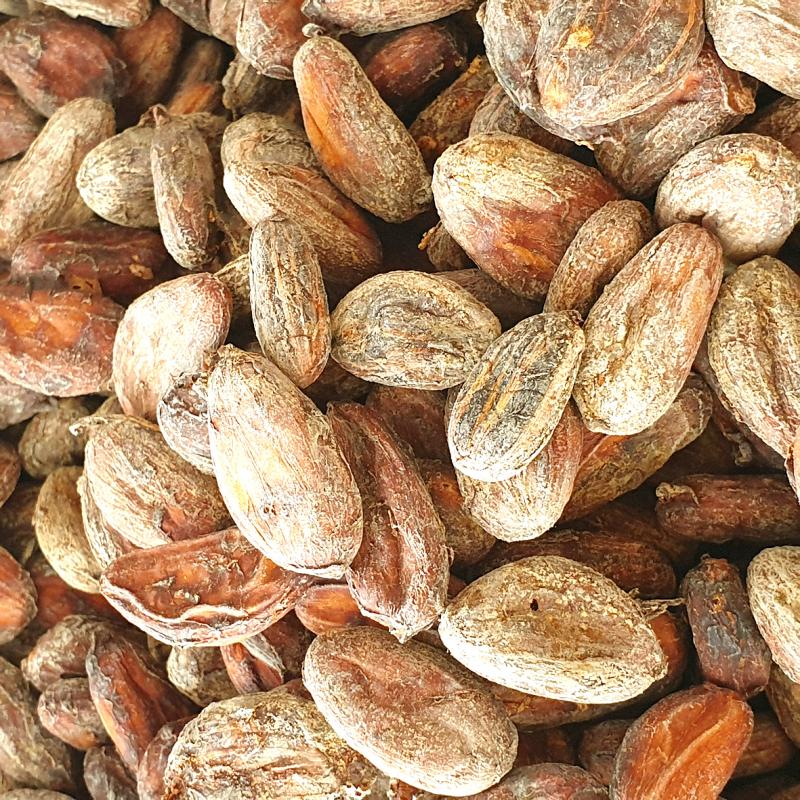
Photo: Katy Hui-wen Hung
Some fields in Namasia are used to grow Jinhuang (金煌) mangoes. This highly popular variety is named after the Taiwanese farmer who spent 12 years developing it, then considerable time improving its appearance and taste. The Jinhuang mango last year received the presidential seal of approval when President Tsai Ing-wen (蔡英文) planting a Jinhuang cutting while visiting Palau.
Alas Istandah, a local indigenous woman who co-manages a restaurant and a campsite, identified intertwining aiyu (愛玉, an endemic subspecies of Ficus pumila used to make a jelly dessert) among the mango trees.
According to Istandah, mango tree roots grow so extensively and deep into the soil that they absorb enough water to nourish what grows around them. They also function as an ideal support for a climbing fig.
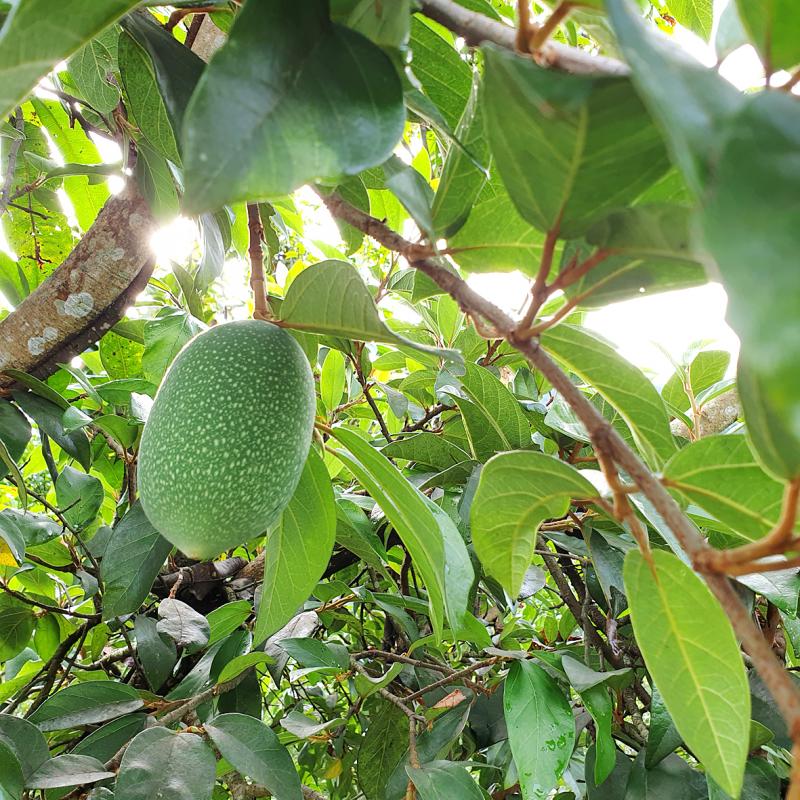
Photo: Katy Hui-wen Hung
“You can see different generations of companion planting methods here,” says Istandah.
She further explains that “older generation” refers to the traditional “marriage of the two” method, in which the farmer planted mango and aiyu roots deep into the soil. The “younger generation” is a shortcut method of growing aiyu by wrapping the vine around a concrete post up for some ten years, before tying it to a supporting mango tree.
“These companion methods have been around for decades,” says Istandah.

Growing up in a rural, religious community in western Canada, Kyle McCarthy loved hockey, but once he came out at 19, he quit, convinced being openly gay and an active player was untenable. So the 32-year-old says he is “very surprised” by the runaway success of Heated Rivalry, a Canadian-made series about the romance between two closeted gay players in a sport that has historically made gay men feel unwelcome. Ben Baby, the 43-year-old commissioner of the Toronto Gay Hockey Association (TGHA), calls the success of the show — which has catapulted its young lead actors to stardom -- “shocking,” and says

The 2018 nine-in-one local elections were a wild ride that no one saw coming. Entering that year, the Chinese Nationalist Party (KMT) was demoralized and in disarray — and fearing an existential crisis. By the end of the year, the party was riding high and swept most of the country in a landslide, including toppling the Democratic Progressive Party (DPP) in their Kaohsiung stronghold. Could something like that happen again on the DPP side in this year’s nine-in-one elections? The short answer is not exactly; the conditions were very specific. However, it does illustrate how swiftly every assumption early in an

Inside an ordinary-looking townhouse on a narrow road in central Kaohsiung, Tsai A-li (蔡阿李) raised her three children alone for 15 years. As far as the children knew, their father was away working in the US. They were kept in the dark for as long as possible by their mother, for the truth was perhaps too sad and unjust for their young minds to bear. The family home of White Terror victim Ko Chi-hua (柯旗化) is now open to the public. Admission is free and it is just a short walk from the Kaohsiung train station. Walk two blocks south along Jhongshan

Jan. 19 to Jan. 25 In 1933, an all-star team of musicians and lyricists began shaping a new sound. The person who brought them together was Chen Chun-yu (陳君玉), head of Columbia Records’ arts department. Tasked with creating Taiwanese “pop music,” they released hit after hit that year, with Chen contributing lyrics to several of the songs himself. Many figures from that group, including composer Teng Yu-hsien (鄧雨賢), vocalist Chun-chun (純純, Sun-sun in Taiwanese) and lyricist Lee Lin-chiu (李臨秋) remain well-known today, particularly for the famous classic Longing for the Spring Breeze (望春風). Chen, however, is not a name